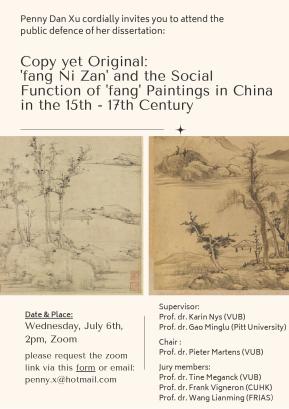Public defence of the doctoral disseration of Penny Dan Xu.
"Copy yet Original: 'fang Ni Zan' and the Social Function of 'fang' Paintings in China in the 15th - 17th Century"
Wednesday 6 July 2022 at 14:00, Online Event (Zoom).
Abstract:
This thesis aims to respond to the subject of Copy and Original, a long-lasting debate in art history, by investigating the function and meaning of Chinese ‘fang’ paintings. Traditionally, Chinese painters favored, and would be praised for, forming a link between contemporary work and classic paradigms. A typical example is the ‘fang’ (artistic imitation) paintings omnipresent in the Ming-Qing period. However, there is more to making a copy than imitating an original; there is more to quoting a commonly known style than paying tribute to the master. Through an investigation of the ‘fang’ paintings made in the style of the scholar-painter Ni Zan (1306-1372) in the 15th to 17th centuries, this dissertation unravels why in some ‘fang’ paintings, the art style was used to evoke a shared emotion or political opinion, but in others, the same style was used as a self-branding strategy. This research probes the social meaning of a style, the changing perceptions of the same model in different historical contexts, and the role of ‘fang’ paintings in the development of scholars’ art. I suggest ‘fang’ paintings can function as ‘sub-originals’ and could be as influential as their original models. Finally, I propose that instead of understanding scholars’ art through the lens of the European category of ‘painting’, we should consider artworks with such strong social features as a kind of ‘language’. In this context, the search for authenticity and questions of attribution have less relevance and importance.

